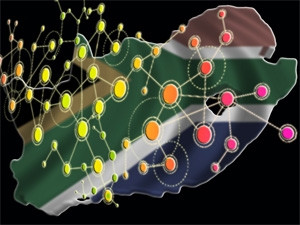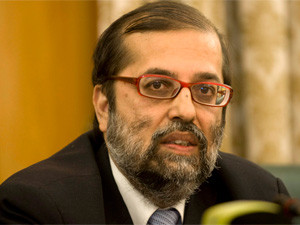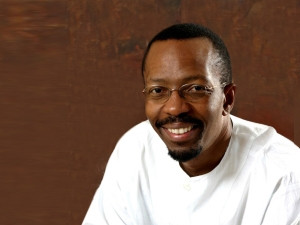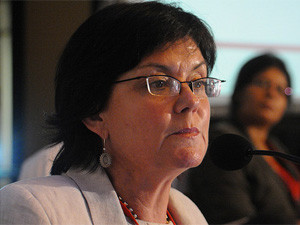
The Department of Communications' (DOC's) newly-formed National Broadband Advisory Council (NBAC) is further evidence of communications minister Yunus Carrim's commitment to taking action to further SA's vital ICT sector.
So says Arthur Goldstuck, MD of World Wide Worx and one of the members appointed to the NBAC yesterday.
Appointed for three years, the council will advise the minister of communications on the implementation of SA Connect, government's broadband policy and strategy that aims to have a 100% connected population by 2030.
The council, which convened for the first time yesterday, comprises independent technical experts and representatives of business, trade unions and civil society. Council for Scientific and Industrial Research (CSIR) president Dr Sibusiso Sibisi has been appointed chairman of the NBAC, while Research ICT Africa's director professor Alison Gillwald has been given the position of deputy chair.
All independent industry experts with an interest in growing and bolstering SA's ICT sector, other members include professor Sunil Maharaj, Mandla Msimang, Goldstuck, Dr Bernie Fanaroff, Mlamli Booi, Geoffrey Qhena, professor Jyoti Mistry, and Jesse Maluleke.
Economic essential
Carrim recently tagged ICT as crucial to economic growth, development and job creation, noting the industry had to be dealt with in the right way, by the right people.
"ICT has huge, huge potential to reduce the gaps between the poor and the rich. But, if not effectively drawn on, it also has just as much potential to increase the divides between the haves and the have-nots, the connected and the unconnected. That we certainly cannot afford. We just can't afford to be left so behind. We need to move - and move fast."
Sibisi says the council's role is to enable SA to develop a competitive economy that encourages innovation and attracts investment through broadband.

Addressing attendees at the launch of the Ikamva National E-Skills Institute recently, Carrim noted there is increasing evidence to support claims that increases in broadband penetration correlate with economic growth and development - "that broadband has the potential to create new jobs, broaden educational opportunities, enhanced public service delivery and rural development".
According to research by the World Bank, every 10% increase in broadband penetration increases economic growth by 1.38%.
It was because of this correlation - and in order to meet the diverse needs of SA's people - that SA Connect was established, notes Carrim. He says the strategy takes "an integrated and cross-cutting - but perhaps more importantly - citizen-centric approach".
A United Nations (UN) Human Rights Council report declares access to the Internet a basic human right, while the UN Broadband Commission is looking to include broadband as a basic human need in the Millennium Development Goals, to be adopted in 2015.
Advisory aims
Goldstuck says one of the encouraging aspects of the NBAC is that it shows a very clear intention from government to allow private enterprises to focus on well-served urban areas, while it encourages public-private partnerships to focus on the underserved and rural areas.
"Most of the council members have spoken for years about the need for government to play a more active role in access rollout in rural areas, because it is not viable for commercial bodies to do so."

One of the key issues Goldstuck will focus on during his time with the council, he says, is the experience of the user on the ground. "It's all well for networks to say they are offering 10Mbps, when the user is getting an Edge-type of connection."
Goldstuck says he will keep a close eye on broadband delivery versus broadband offerings. "That is, the functional speed - as opposed to the advertised speed."
Secondly, he says, the cost of broadband is a big issue. "I firmly believe there needs to be vigorous action taken to lower the cost for the poorest of the poor - otherwise we will never be able to bring them on board."
Another key element in the broadband box, says Goldstuck, is that of motivation. "People have to have a reason to use broadband. Up till now, social media has been the biggest driver of mobile Internet usage - but it shouldn't be dependent on a service that is delivered from a distant land. There should be real use cases in SA, as opposed to business cases."
He says access to educational content and provision of educational content is a key element in the mix - but so is access to government services, as well as the streamlining of access to government services.
More issues will emerge as the advisory board goes along, says Goldstuck, and more perspectives will emerge that will require input from different points of view. For now, rollout and cost are at the top of the council's list, he says.
"My personal focus has always been on what the user experience is in terms of access and cost."
He says the independence of the council members - and the fact that the council does not require consensus for a point to be put forward to government - bode well for the effectiveness of the NBAC.
"We represent the public speaking to government, not the government speaking to the public."
Energetic action
Since the adoption of SA Connect, three months ago, 782 schools have been provided with computers as part of what Carrim says is an aim to give further impetus to SA's broadband plan. The DOC's new e-skills institute, Ikamva, was also launched two weeks ago.
SA Connect is based on a four-pronged strategy: digital readiness, digital development, digital future and digital opportunity.

"SA Connect seeks to mobilise the capabilities, resources and energies of the public and private sectors and civil society, in order to connect South Africans to each other, as well as SA to the continent and the world," says Carrim.
Carrim has been lauded for bringing energy and action to a department that has been criticised for inertia, infighting and instability - and which, under former minister Dina Pule, made headlines for all the wrong reasons.
At the DOC helm for just under eight months now, Carrim has repeatedly expressed the need to take immediate action to amend some of the ills and mistakes of the past.
Biographies of Dr Sibusiso Sibisi and Prof Alison Gillwald:
Dr Sibusiso Sibisi took office as president of the CSIR at the beginning of 2002. He previously held the position of deputy vice-chancellor (research and innovation) at the University of Cape Town.
Born in Mariannhill, KwaZulu-Natal, Sibisi completed a BSc (Hons) in physics at Imperial College, London, and obtained a PhD from the Department of Applied Mathematics and Theoretical Physics (DAMTP), Cambridge University in 1983. He joined the Department of Computational and Applied Mathematics, University of the Witwatersrand in 1984 and was a Fulbright Fellow at the California Institute of Technology in 1988.
Sibisi returned to Cambridge in 1989 to assume a research position at DAMTP and in 1991, co-founded a research-based small enterprise at Cambridge. On his return to SA, in 1997, Sibisi joined Plessey as executive director of research and development before joining UCT.
He is a former chairman of SA's National Advisory Council on Innovation.
Sibisi was awarded the Order of Mapungubwe: Silver, by president Thabo Mbeki, in September 2007. National Orders are bestowed on South Africans who contribute to the betterment of the country in their respective fields.
Prof Alison Gillwald is director of Research ICT Africa, a 20 African-country ICT policy and regulatory research network, which is based in Cape Town and funded by the International Development Research Council.
She has been responsible for raising funds and directing this multimillion-rand project with the purpose of developing on the continent the data and analysis necessary for evidence-based ICT policy and effective regulation. The programme, now in its seventh year, covers countries in North, South, East and West Africa.
Prior to this, Gillwald was, until 2008, associate professor at the Witwatersrand University Graduate School of Public and Development Management, where she founded the Learning Information Networking and Knowledge Centre in 1999 with the purpose of fast-tracking ICT policy and regulatory training in Southern Africa.
From the initial start-up of the programme with an executive professional certificate, the centre is now responsible for a full Masters in ICT Policy and Regulation at the Graduate School of Public and Development Management at Witwatersrand University, and has trained hundreds of policy-makers, regulators and operators across the continent.
Gillwald has provided technical assistance to the Independent Communications Authority of South Africa on local content and under-serviced area telecoms licensing. She has also provided technical assistance to the Competition Commission on anti-competitive practice disputes and on mergers and acquisitions in the telecoms sector.
SA's broadband targets to 2030, courtesy of Ellipsis Regulatory Solutions:
Target | Penetration measure | Baseline (2013) | By 2016 | By 2020 | By 2030 |
Broadband access in Mbps user experience | % of population | 33.7% Internet access | 50% at 5Mbps | 90% at 5Mbps 50% at 100Mbps | 100% at 10Mbps 80% at 100Mbps |
Schools | % of schools | 25% connected | 50% at 10 Mbps | 100% at 10Mbps 80% at 100Mbps | 100% at 1Gbps |
Health facilities | % of health facilities | 13% connected | 50% at 10Mbps | 100% at 10Mbps 80% at 100Mbps | 100% at 1Gbps |
Public sector facilities | % of government offices | 50% at 5Mbps | 100% at 10Mbps | 100% at 100Mbps |
Government will review these targets periodically and supplement them by pricing and quality of service targets, as well as speed of installation and fault repair.
Share